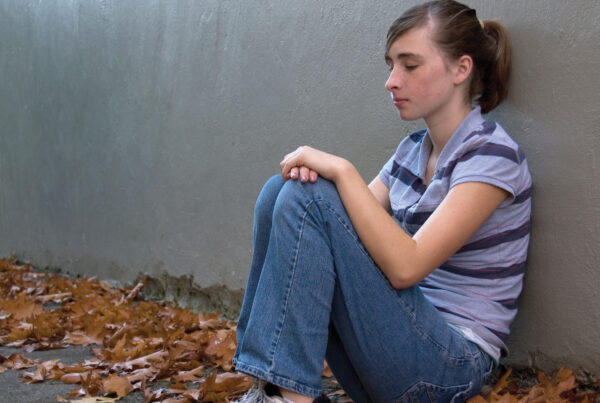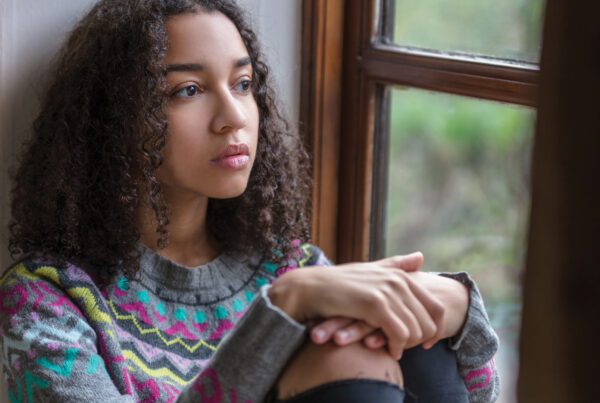At 34, Shakira struggles to get out of bed each morning. It takes everything she has to get her three children to school and day care each day. Any remaining energy is spent navigating the two buses and a train to get to her day job as a home health worker, where she takes care of an elderly patient with dementia. At times, Shakira struggles with bouts of anxiety and depression. Even if she had the time and resources to get help, she can’t bring herself to see a mental health therapist or counselor. Therapy is for rich people who have extra time on their hands, she believes. Getting support for mental health is embarrassing or shameful, and no one wants to admit they have mental health issues, she insists. And, so, Shakira continues to struggle in silence, praying each day that she won’t reach the breaking point that will push her over the edge.
———————–
According to the National Institute of Mental Health, nearly one in five U.S. adults live with a mental illness, with rates among People of Color being similar but often resulting in disorders that last longer and lead to more significant disabilities. Despite this, most mental illness in communities of color go untreated amid disparities in therapy or counseling access: almost half of White Americans with mental illnesses receive treatment, compared to only 33% of the Hispanic and Latinx community, 31% of the African American/Black community, and 25% of the Asian American and Pacific Islander communities. These disparities are further compounded by systemic challenges and wealth disparities, as evidenced in our Lehigh Valley area in Pennsylvania where a significant gap exists between White families and People of Color. Data spanning 2018 to 2022 from American Community Service indicates that nearly 22% of Hispanic/Latino residents live below the poverty line, in stark contrast to just 6.7% of White, non-Hispanic families. This indicates not only a clear racial disparity in poverty rates but also highlights the intricate connection between race, poverty, and mental health struggles, with communities of color constituting a significant portion of the population living in poverty, compared to their White, Non-Hispanic/Latino counterparts.
Mental health stigma and bias, pervasive across public, cultural, and self-imposed spheres, are multifaceted issues that mental health experts attribute to negative attitudes, beliefs, and behaviors towards those with mental illness. Public stigma arises from societal perceptions, while cultural stigma is reinforced by portrayals in media, such as African American movies depicting those with mental illness as street bums or cast-offs. Additionally, self-stigma involves internalizing these negative societal beliefs. This complex web of stigma is intertwined with the challenges of poverty and race, creating systemic and socioeconomic barriers that exacerbate mental health issues. Discrimination affects employment and education opportunities, leading to job insecurity, lower income levels, and a cycle of poverty that is hard to break, particularly in impoverished neighborhoods which lack engaging recreational spaces and contribute to higher rates of mental health concerns. Moreover, historical injustices and systemic racism contribute to intergenerational trauma, disproportionately impacting the mental and physical well-being of People of Color.
In 2018 our Pennsylvania-based organization, Community Action Lehigh Valley (CALV), launched the Color Outside the Lines Initiative (COTL), a strategic plan spanning five to seven years aimed at eliminating racial inequities and reducing disparities in housing, education, economic opportunity, employment, criminal justice, healthcare, mental health, arts and culture, and recreation. As a local anti-poverty nonprofit, Community Action’s mission is to improve the quality of life in our surrounding areas by building communities in which all people have access to economic opportunities. Our service areas range from advocacy and business development to food access, neighborhood revitalization, and youth programming.
“At the intersection of poverty and systemic racism, we focus not just on the challenges, but the opportunity to make profound differences in the lives of those who are most in need of our support,” said Dawn Godshall, CALV’s executive director.
COTL’s latest initiative offers a free mental health service program to eligible individuals, providing up to seven therapy sessions at no cost, aiming to ensure more people like Shakira feel comfortable seeking the help they need. To qualify for this program, applicants must identify with one or more of the following categories: Black, Indigenous, People of Color (BIPOC), or belong to another underserved group. Additionally, they should be low-to-moderate income residents of the Lehigh Valley Metro Area. Finally, applicants are required to provide a referral contact, which does not need to be a healthcare professional. Acceptable referral contacts include case workers, guidance counselors, managers, teachers, worship leaders, or parents, making the referral process more accessible.
“We’re hoping this initiative will change attitudes,” said Winslow Mason Jr., the director of the agency’s Racial and Ethnic Justice Program, who oversees the initiative. “The mental health program will track participant attitudes before and after their therapy sessions. We hope to see public, cultural, and self-imposed negative attitudes about mental health change as a result.'” (The agency received a $25,000 donation from a local bank to support the initiative.)
CALV is deeply committed to addressing the intertwined issues of poverty, mental health, and systemic racism, taking a direct approach that spans programming focused on educational disparities, business start-up and development, food access and nutrition, housing security, and more. Their initiatives aim to tackle the root causes of these disparities, striving to create communities where all people have access to economic opportunities and a voice in the decisions that affect lives.
In this landscape of effort and change, Shakira’s isolation in her struggles highlights a broader challenge. However, as awareness grows and more individuals recognize the need for support in coping and problem-solving within our complex world, there’s hope that counseling and therapy will be embraced more widely as an essential, proactive measure rather than seen as an often-unobtainable last resort. We look forward to continuing this bold initiative to ensure a productive and equitable future for all.
 Ela Madrazo serves as the Director of Marketing & Communications for Community Action Lehigh Valley and specializes in advancing mission-driven initiatives. Her career in marketing and business development has spanned various sectors, including food access, women-owned businesses, environmental advocacy, and currently anti-poverty efforts.
Ela Madrazo serves as the Director of Marketing & Communications for Community Action Lehigh Valley and specializes in advancing mission-driven initiatives. Her career in marketing and business development has spanned various sectors, including food access, women-owned businesses, environmental advocacy, and currently anti-poverty efforts.
 Winslow Mason, Jr., is a journalist, Diversity, Equity and Inclusion (DE&I) consultant, Medicare Advisor and Organizational Development Practitioner who serves as the Director of Racial and Ethnic Justice programs for Community Action Lehigh Valley.
Winslow Mason, Jr., is a journalist, Diversity, Equity and Inclusion (DE&I) consultant, Medicare Advisor and Organizational Development Practitioner who serves as the Director of Racial and Ethnic Justice programs for Community Action Lehigh Valley.






